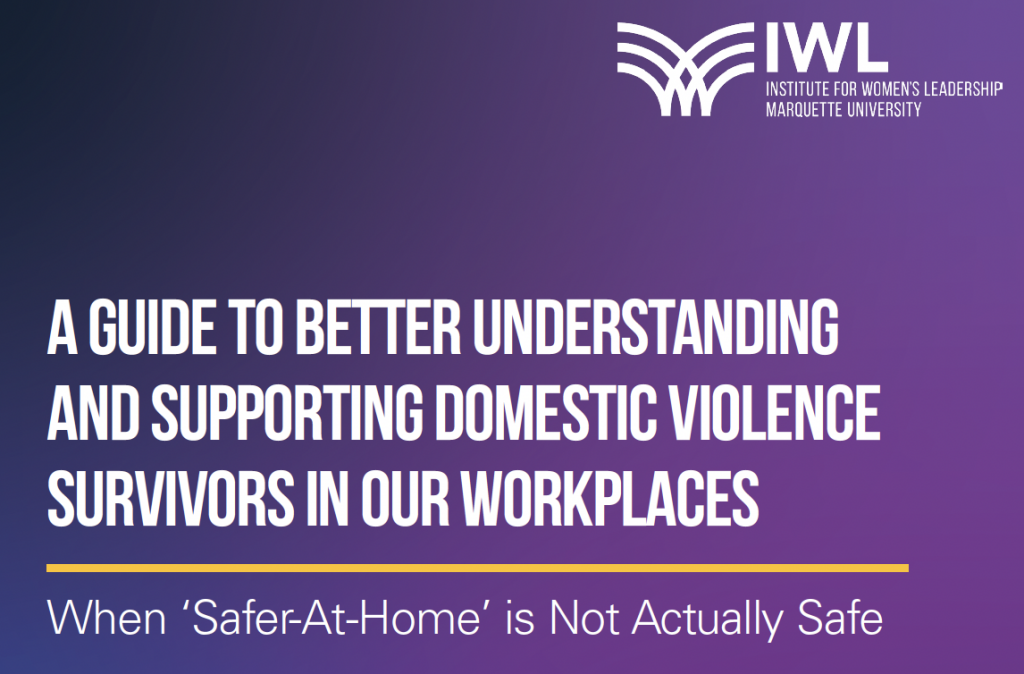Marquette Institute for Women’s Leadership study finds employers can play role in mitigating impacts of domestic violence
MILWAUKEE — When employers have supportive policies and when employees utilize them, domestic violence survivors have improved outcomes, according to a white paper published by the Institute for Women’s Leadership at Marquette University, which focuses on better understanding and supporting domestic violence survivors in the workplace.
The paper, “A Guide to Better Understanding and Supporting Domestic Violence Survivors in Our Workplaces: When ‘Safer-At-Home’ is Not Actually Safe,” was published today in time for Denim Day — an international day of action and awareness in which people are encouraged to wear denim to combat victim blaming and educate others about sexual violence.
“The global COVID-19 pandemic affected already vulnerable populations in so many ways. ‘Safer-at-home’ orders were designed to minimize the spread of a deadly virus, but inadvertently increased deadly situations for those in unsafe home environments,” said Schneider, who is a professor of law at Marquette University Law School.
As Webster noted, “Even before the pandemic, it was clear that domestic violence impacts the workplace in both safety when domestic violence turns up at work and the hidden economic impact on survivors, the economy, and their employers. We sought out to understand these impacts better and help guide policies and resources so that employers can help mitigate the impact on survivors and the workplace.”
Researchers worked with the Sojourner Family Peace Center and the Milwaukee County Courts. The research was also supported by Marquette’s President’s Challenge for COVID-19 Response, which was launched to address needs and opportunities in the Milwaukee community that have been created or magnified by the pandemic.
The white paper outlined a variety of preventive, protective and intervention strategies employers can adopt to support survivors and improve their outcomes.
- Preventative strategies educate employees so both potential perpetrators and potential survivors can recognize and understand which behaviors constitute domestic violence.
- Protection strategies are measures that protect employees who are survivors of domestic violence survivors in the workplace and have reported their abuse to their respective organizations.
- Intervention strategies are those implemented to assist victimized employees in obtaining resources to combat the abuse, as well as supporting survivors in various ways while they are experiencing these terrible situations.
Researchers also offered a review of local and national initiatives that serve as resources, an overview of the legal structure, and a sample domestic violence policy that can be implemented by organizations.
Additional Marquette co-principal investigators on the interdisciplinary community research project include Sarah Camp, IWL coordinator, and Dr. Heather Hlavka and Dr. Aleksandra Snowden, associate professors of social and cultural sciences in the Klingler College of Arts and Sciences.
The Institute for Women’s Leadership builds upon Marquette University’s historic role as the first coeducational Catholic university in the world beginning in 1909. The mission of the IWL is to advance women’s leadership locally and globally through pioneering research, innovative programming and collaborative engagement.
NOTE: This press release was submitted to Urban Milwaukee and was not written by an Urban Milwaukee writer. While it is believed to be reliable, Urban Milwaukee does not guarantee its accuracy or completeness.
Mentioned in This Press Release
Recent Press Releases by Marquette University
New Marquette Law School Poll finds large majority of Wisconsin voters not yet tuned in to who is running in major 2026 elections
Oct 29th, 2025 by Marquette UniversityNo candidate has established strong position in public favorability in governor, state Supreme Court races; large majorities of voters undecided
New Marquette Law School National Survey Finds Large Majority Think Political Violence is a Big Problem, But With Sharp Partisan Differences
Oct 1st, 2025 by Marquette UniversityAmericans are overall pessimistic on reducing intense political conflict; half of those polled say heated language by leaders makes violence more likely























